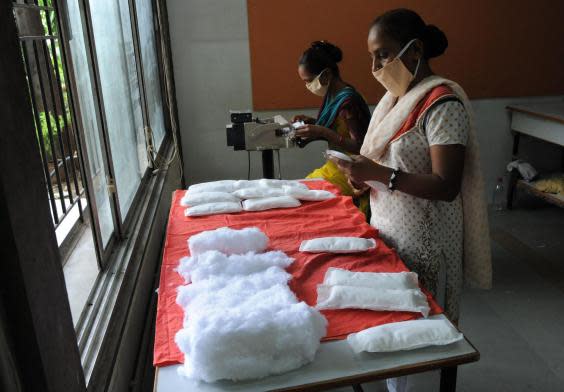Oscar nominations: Indian documentary about 'The Tampon King' makes Academy shortlist
Arunachalam Muruganantham’s journey of invention started all the way back in 1998.
Newly married, he was horrified to see his wife Shanthi Natrajan using old rags during her menstrual cycle. If she bought the sanitary napkins sold in in the shop, she told him, she could not afford milk for the family.
Mr Muruganantham set about developing a machine to create safe, affordable pads, a journey that led him to wearing a football bladder of animal blood to trial a prototype that would eventually win him awards. On Tuesday, his creativity was further underscored when a documentary about his invention was nominated for an Oscar.
Period. End of Sentence, a documentary directed by Rayka Zehtabchi, produced by Guneet Monga and which started life as a Kickstarter crowd-sourcing project by students and teachers at Oakwood School in Los Angeles and the non-profit group Girls Learn International, has been nominated in the best documentary (short subject) category.
“In the rural village of Hapur, outside of Delhi, India, women hope to make feminine hygiene supplies easily available and end the stigma surrounding menstruation, which often results in girls having to drop out of school,” says the film’s synopsis.
“A machine that makes sanitary pads is installed, and the women operating it find financial security and independence.”
The film is competing against Black Sheep, which tells the story of a Nigerian boy who moves to Britain; End Game, which tells the story of hospice workers in San Francisco; Lifeboat, about a German group that tries to prevent migrant being drowned; Blackkklansman, which tells the story of a Jewish officer who goes undercover in the KKK, and A Night at the Garden, which tells of the 1939 event when 20,000 Americans filled Madison Square Gardens to celebrate Nazism.
As news of Period. End of Sentence’s nomination broke, celebrations stretched from California to India. “We are over the moon to be nominated,” tweeted Monga, the producer, best known for her films Gangs of Wasseypur – Part 1 and The Lunchbox.
Paying tribute to the pupils who helped get the film made, she added: “We all made it happen. This is so EPIC.”
Melissa Berton, an English teacher at the school and a driving force behind, the project, told The Independent they had learnt of Mr Muruganantham’s invention six or seven years ago and were determined to make the film.
She said she hoped the film would help draw attention to issues surrounding women’s health, the destigmatisation about menstruation through education and the need to keep girls in school to complete their education.
“There is also a sense of agency because women using these machines are making money for the first time,” she said.
We all made it happen! @RAYning @melissaberton @lisataback @StaceySher @Garrettschiff @douglasblush @mesopystic @samdavisdp and all the young girls who saw this dream from Oakwood school !! This is so EPIC !! https://t.co/haFDm5qcEm
— Guneet Monga (@guneetm) January 22, 2019
There was no immediate word from Mr Muruganantham, who in 2016 was awarded the Padma Shri, India’s fourth highest civilian honour, for his invention, what not only boosted women’s health and dignity, but also provided a means of employment. In 2014, he was included in Time magazines list of the world 100 most influential people.
India still suffers from a huge problem of a lack of access to basic sanitation and sanitary supplies, something that overly impacts women.
Women also face the centuries-old taboos linked to menstruation and in some parts of the country are considered “unclean”.

Easier this month, protests erupted among conservative Hindu groups after two women defied a ban on entering a temple in the state of Kerala.
The women entered Sabarimala temple after its ancient ban on women aged 12-50 entering, was overturned by India’s supreme court. In the end, more than four million women created a human chain stretching across hundreds of miles of Kerala, in support of the women who had entered.
In a 2012 interview, Mr Muruganantham, whose story received the Bollywood treatment in the form of Pad Man, featuring Akshay Kumar, and Sonam Kapoor, said he had received interest in his machine from governments around the world.
He said: “What I am trying to do is develop a low-cost model across the globe.”

 Yahoo News
Yahoo News 